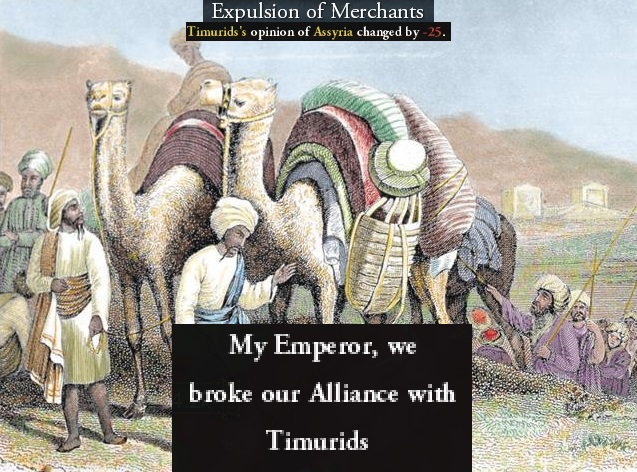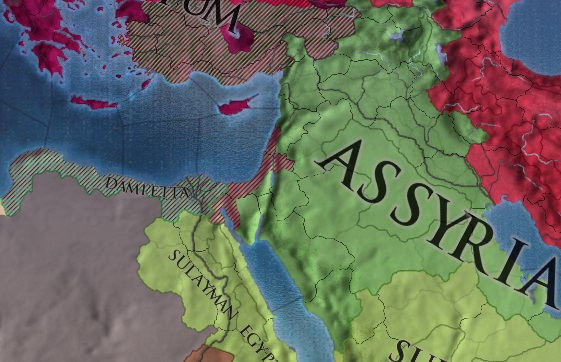Update on previous page.
The persistence of divisions in Assyria really leaves us vulnerable whenever we get into foreign conflicts. It seems unlikely that the recent approach of purges and land and property seizures will lead to a more harmonious society. And always risky to be cultivating unhappiness among settler communities!
The Sulaymans were on and off Timurid allies for much of this game. At this point I believe they were striking it out on their own with allies with smaller Muslim powers in East Africa and the Indies. That is a very big and porous border we have cutting through Arabia and Egypt, a serious strategic risk that has not really been addressed - the Muslim Arab southern periphery of Assyria perhaps not having the cache of the wealthier Kingdoms to the north.
And unthinking hatred of the Greeks has truly become a cherished tradition to the Assyrians over the centuries!
This is certainly on my horizons. In game Damietta is now so large that it is a huge investment of time and resources to actually integrate it, while the country is also a revolt risk by this point. But the rewards of incorporation would be great.
You don't enjoy the strange Assyrian exclave in Georgia completely surrounded by Timurid territory? . They rewarded that to me in one of the wars with Byzantium (the only one where the peace was negotiated by the Timurids and they didn't leave us completely empty handed). It does look somewhat bizarre.
. They rewarded that to me in one of the wars with Byzantium (the only one where the peace was negotiated by the Timurids and they didn't leave us completely empty handed). It does look somewhat bizarre.
The last was went very poorly, and if we hadn't been bailed out yet again could have seen us losing territory. There remains much work to do if we are to catch up with the greatest powers and assert our full independence.
They've even gotten quite a bit stronger during the Early Modern era compared to where they were in CK2, while we have probably gone backwards. Even at the start of EU4 we could go toe to toe with the Timurids and had a successful war with the Byzantines too.
We could see in this most recent update, Yeshua desperately trying to pursue those ambitions of striking out on his own and against the hated Greeks to restore Assyria's greatness. And failing miserably. Let us see if another Indian adventure can restore Assyria's pride.
The colonies expand...
Religious conflict in Assyria rises again. That could prove problematic if they go to war against the Byzantines...
The persistence of divisions in Assyria really leaves us vulnerable whenever we get into foreign conflicts. It seems unlikely that the recent approach of purges and land and property seizures will lead to a more harmonious society. And always risky to be cultivating unhappiness among settler communities!
Are the Sulaymans still allied to the Timurids?
Because when Assyria's alliance with them eventually comes to an end, that exposed southern border in Egypt and Arabia can be a real pain.
With Italy as a deterrent against the Byzantines, it might have been better to secure the Arabian coastline and access to the colonies than to start another costly war against the Byzantines.
But then again, when have Assyrian Kings ever chosen the logical path over the "screw you, Greeks!"path
The Sulaymans were on and off Timurid allies for much of this game. At this point I believe they were striking it out on their own with allies with smaller Muslim powers in East Africa and the Indies. That is a very big and porous border we have cutting through Arabia and Egypt, a serious strategic risk that has not really been addressed - the Muslim Arab southern periphery of Assyria perhaps not having the cache of the wealthier Kingdoms to the north.
And unthinking hatred of the Greeks has truly become a cherished tradition to the Assyrians over the centuries!
Time to incorporate Damietta fully?
This is certainly on my horizons. In game Damietta is now so large that it is a huge investment of time and resources to actually integrate it, while the country is also a revolt risk by this point. But the rewards of incorporation would be great.
What I would really like to see is a remedy to the absurd bordergore of the South Caucasus and a comfortable northern border anchored by the mountains, but I suppose a war against the Byzantines could be a start to that. A consolidation of our position, including the full integration of Damietta, would seem to be in accordance with our centralizers' ambitions in any case. We'll see if that gives us the leverage we need to maneuver out of the Timurid camp and stand on our own two feet
You don't enjoy the strange Assyrian exclave in Georgia completely surrounded by Timurid territory?
The last was went very poorly, and if we hadn't been bailed out yet again could have seen us losing territory. There remains much work to do if we are to catch up with the greatest powers and assert our full independence.
The Romans have lasted for longer (and more strongly) in this ATL than in ours. Maybe it’s time to really start breaking them down if Assy is going to fulfil its destiny.That is, developing the strength to stand alone from - even up to - the Timurids.
Good news!
Ooh, make sure you have some image and game files backed up somewhere else too. Here’s hoping the sailing is smooth from here.
They've even gotten quite a bit stronger during the Early Modern era compared to where they were in CK2, while we have probably gone backwards. Even at the start of EU4 we could go toe to toe with the Timurids and had a successful war with the Byzantines too.
We could see in this most recent update, Yeshua desperately trying to pursue those ambitions of striking out on his own and against the hated Greeks to restore Assyria's greatness. And failing miserably. Let us see if another Indian adventure can restore Assyria's pride.
- 2
- 1
















